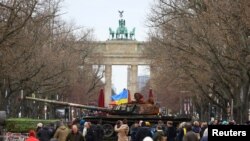On the first anniversary of Russia’s full-scale invasion of Ukraine, the Berlin Story Bunker Museum positioned a wrecked Russian tank in front of Russia’s Embassy in Berlin near the iconic Brandenburg Gate.
The tank was destroyed on the outskirts of Kyiv last March and delivered to Germany with the Ukraine Defense Ministry’s help. It serves as a symbol of the Russian President Vladimir Putin’s “downfall,” the museum’s curator Wieland Giebel told Reuters.
On February 25, Germany’s socialists and far-right parties held a “Rebellion for Peace” rally at the same location. The organizers demanded that the German government stop providing military aid to Ukraine. According to the Deutsche Welle, the rally’s organizers, “renegade socialist politician” Sahra Wegenknecht and writer Alice Schwarzen, called for negotiations with Russian President Vladimir Putin, claiming that “there is no defeating the greatest nuclear power” and warning of World War III if a settlement is not reached. (Nuclear saber-rattling is Vladimir Putin’s signature threat.)
On Twitter, the far-right Alternative for Germany (AfD) party used the hashtag “b2502” (i.e. “Brandenburg, February 25”) to claim that 50,000 attended the rally.
“More than 50,000 participants came to b2502…”
That is false. Reputable news agencies, including Reuters and Deutsche Welle, reported that the Berlin police said 10,000 to 13,000 people attended the protest.
The Guardian published photographs of people wrapped in Ukrainian flags and carrying banners that read “Stop Putin’s War,” “Help Ukraine defend itself,” and “Not delivering weapons to Ukraine is the equivalent to genocide support.” Many Ukraine sympathizers came to the “Rebellion for Peace” rally to protest against its pro-Russian agenda, the newspaper reported.
Videos, shared on Twitter, showed AfD members trying to prevent Ukraine supporters from raising their banners.
AfD tweeted a photograph of its leader, Joerg Urban, at the rally holding a white paper pigeon – a symbol of peace.
The far-right party has long been accused of having ties with the Kremlin, and Urban was among the AfD leaders who visited Russian-occupied Ukrainian territory at Moscow’s invitation.
A prominent advocate of right-wing extremism, Urban has claimed that to survive as a nation, Germany must remain “homogeneous.” In 2021, German intelligence put AfD under surveillance, making it the country’s first major political party since World War II to be formally monitored as a threat to its constitution.
In Russia, the state media reported the Berlin rally was a show of support for Russia. Most reports have focused on the rusted tank in front of the Russian embassy.
“The place has become a shrine for the Germans’ pilgrimage… thousands and thousands of Berliners laid flowers on the Russian tank,” said Yevgeny Popov, host of “60 Minutes,” the highly-watched talk show on Channel 1 state television, on February 26. The video footage showed the tank covered in red roses.
RT, formerly Russia Today, the Kremlin’s main foreign propaganda outlet, published a video of the tank that said Berliners laying flowers on the Russian tank “has become a symbol of the fight against neo-Nazism in Ukraine.” (Putin used the neo-Nazi propaganda narrative in justifying the attack on Ukraine.)
Yet footage broadcast by Popov’s “60 Minutes” also showed AfD members tearing a Ukrainian flag off the tank and keeping people from approaching it.
It also showed Alexander von Bismarck, a well-known German supporter of Vladimir Putin, explaining it was members of his group who brought the flowers to the tank.
“It is very important that we have brought 2,000 roses and laid them on the tank in front of the Russian embassy,” Bismarck said. “It is to show our government that it needs to start negotiating. Russia is not our enemy. We are friends. We have been building these relations for the last 30 years.”
Like the AfD leaders, Bismarck has visited Russia at the Kremlin’s invitation several times, including as a foreign observer during Putin’s presidential election in 2018. The European Union included Bismarck on its list of “fake observers” brought from abroad to help Russia try to pass that vote off as democratic and transparent.
The “Rebellion for Peace” rally was criticized in Germany, with Finance Minister Christian Lindner saying its organizers did not support Ukraine and were thus “on the wrong side of history.” Katja Mast, a representative of the Social Democratic Party in the Bundestag, said the organizers “serve Russian propaganda.”





